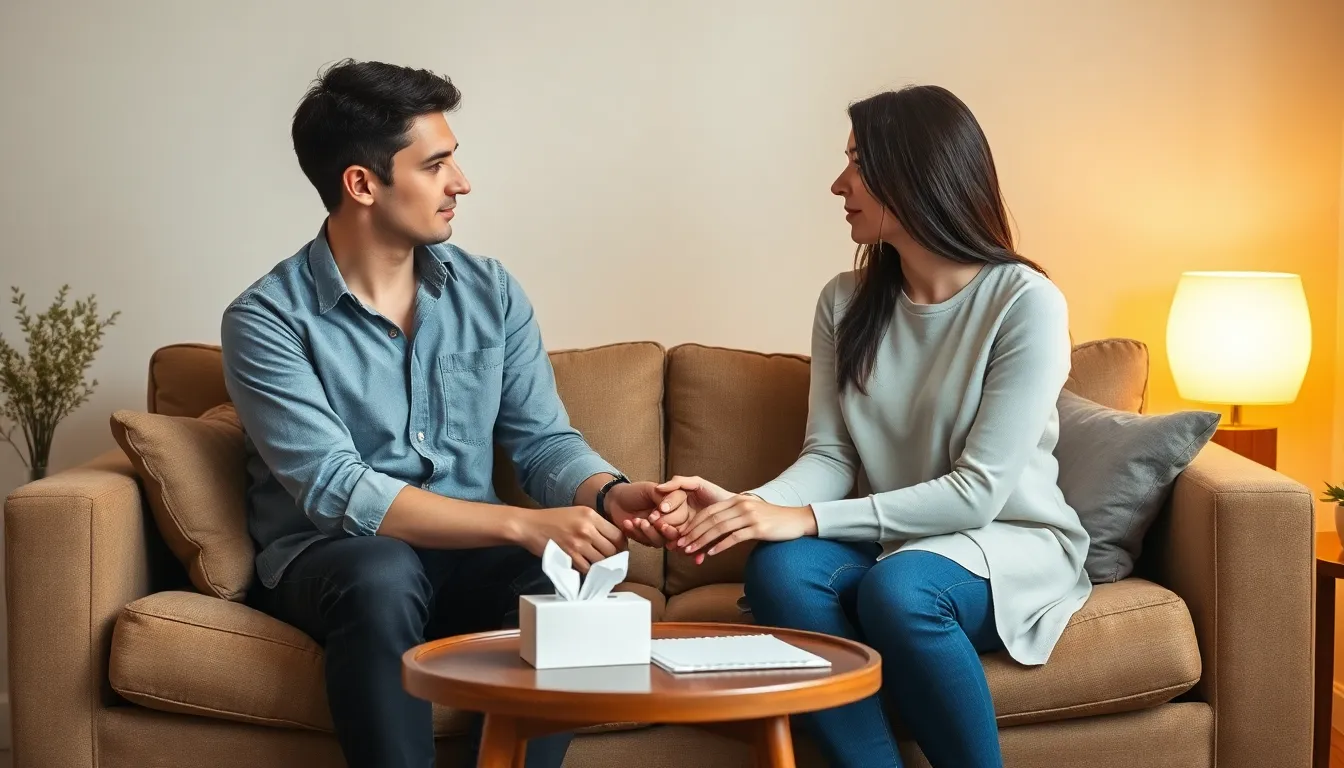Navigating the ups and downs of a relationship can feel like trying to assemble IKEA furniture without the instructions. One minute, everything’s smooth sailing, and the next, you’re lost in a sea of confusion and miscommunication. Enter relationship therapy, the expert guide that helps couples untangle their emotional knots and build a stronger foundation for love.
Think of relationship therapy as a GPS for your partnership. It helps couples find their way back to each other, even when detours and roadblocks seem insurmountable. With the right therapist, couples can learn to communicate better, resolve conflicts, and rediscover the joy that brought them together in the first place. So if love feels a bit like a sitcom gone wrong, it might just be time to call in the professionals.
Table of Contents
ToggleOverview of Relationship Therapy
Relationship therapy serves as a resource for couples facing challenges in their relationships. It offers guidance to enhance connection and communication.
Definition and Purpose
Relationship therapy involves professional counseling aimed at helping couples navigate difficulties. This therapeutic approach focuses on improving communication, understanding emotions, and resolving conflicts. By addressing underlying issues, couples can reconnect and strengthen their partnership. The purpose of relationship therapy is to facilitate healthier interactions and provide tools for managing relationship dynamics effectively. Such therapy enables partners to rediscover joy and intimacy, enhancing the overall quality of their bond.
Types of Relationship Therapy
Several types of relationship therapy exist, each tailored to specific needs. Couples therapy targets communication and conflict resolution, engaging both partners in the process. Family therapy encompasses broader family dynamics, addressing issues that affect the whole unit. Premarital counseling prepares couples for marriage by discussing expectations and potential challenges. Furthermore, individual therapy supports personal growth, which can ultimately benefit the relationship. Each type of therapy provides unique strategies and techniques to help partners navigate their unique situations effectively.
Benefits of Relationship Therapy

Relationship therapy offers numerous advantages for couples seeking to strengthen their bond. Professionals help partners develop healthier dynamics, leading to improvement in their overall relationship quality.
Improved Communication
Communication enhancement serves as a primary benefit of relationship therapy. Couples learn effective techniques to express feelings and needs without escalating conflicts. Therapists guide partners in active listening, fostering mutual understanding. Clarifying misunderstandings becomes easier, leading to reduced frustration and confusion. With improved skills, partners find themselves discussing sensitive topics without fear of conflict. This openness promotes a safer emotional environment, encouraging honesty and vulnerability. As they navigate tough conversations, communication transforms into a positive force rather than a source of discord.
Enhanced Emotional Connection
Emotional connection enhancement represents another significant advantage of relationship therapy. Partners explore their feelings in a supportive setting, deepening their empathy for one another. Therapists guide discussions around emotional needs, promoting awareness of each partner’s perspective. By addressing underlying issues, couples often uncover unresolved emotions that block intimacy. Gradually, partners develop a greater sense of closeness and attachment. As they connect on deeper levels, trust flourishes, allowing love to thrive. This rejuvenation nurtures the bond, enabling couples to share experiences meaningfully and joyfully.
Techniques Used in Relationship Therapy
Several techniques serve as the foundation for effective relationship therapy, guiding couples towards improved interaction and understanding.
Cognitive Behavioral Therapy
Cognitive Behavioral Therapy (CBT) focuses on identifying and changing negative thought patterns. Therapists help couples recognize how their thoughts influence behaviors and emotions. Couples learn to challenge irrational beliefs and develop healthier patterns of thinking. Skills acquired during CBT sessions promote constructive communication. For example, partners may practice rephrasing blame into requests, fostering a more respectful dialogue.
Emotionally Focused Therapy
Emotionally Focused Therapy (EFT) emphasizes the emotional bond between partners. This approach identifies patterns of interaction that contribute to conflict. Therapists guide couples in expressing vulnerable emotions in a safe environment. As partners explore their feelings, they foster deeper understanding and empathy. Positive emotional exchanges strengthen relationships, allowing couples to build a secure attachment. Successful implementation of EFT enhances connection and intimacy, promoting lasting change.
Choosing the Right Therapist
Selecting a therapist requires careful consideration. Couples clinic dynamics shape the choice of the right professional.
Qualifications and Experience
Therapists should possess specific qualifications. Degrees in psychology or social work demonstrate educational background. Licensure assures training standards. Experience in relationship therapy is equally vital. Professionals often specialize in areas such as conflict resolution or communication improvement. Experience in various couple dynamics enhances the therapist’s effectiveness. Asking about their success rate provides insight into their capability. Comfort with the therapist also plays a crucial role. A connection fosters openness and encourages honest discussions.
Finding a Suitable Approach
Different therapeutic approaches cater to unique needs. Couples might prefer methods like Cognitive Behavioral Therapy, which targets negative thought patterns. Emotionally Focused Therapy emphasizes emotional bonds, enhancing empathy. Researching the therapist’s approach aids in making informed decisions. Some therapists may blend various techniques for individual situations. Discussing these approaches during the initial consultation allows couples to evaluate compatibility. Ensuring the chosen method aligns with personal preferences is essential for successful therapy outcomes.
Challenges in Relationship Therapy
Navigating relationship therapy poses several challenges that can hinder progress. Understanding these obstacles helps couples address them more effectively.
Common Barriers to Success
Couples frequently encounter barriers in relationship therapy. Communication issues often surface as partners struggle to articulate feelings and needs. Unresolved past conflicts can resurface, complicating the therapeutic process. Emotional resistance builds when individuals fear vulnerability or judgment from their partners. Schedule conflicts also impede consistent attendance, jeopardizing continuity in therapy. The absence of clear goals contributes to misunderstandings about the therapy’s purpose. Couples work best when they acknowledge these obstacles and actively seek strategies to overcome them.
Managing Expectations
Managing expectations plays a crucial role in the success of relationship therapy. Couples often expect immediate resolution, yet healing takes time and patience. Realistic goals help partners measure progress without undue pressure. Therapists guide clients in understanding that setbacks are part of the healing process. Building trust within the therapeutic space requires openness and consistency. As couples engage in therapy, they must embrace the journey rather than focus solely on the destination. Acknowledging that growth happens gradually fosters a more positive mindset, encouraging couples to remain committed to the process.
Embracing relationship therapy can be a transformative step for couples seeking to rebuild their connection. By enhancing communication and fostering understanding, partners can navigate their challenges more effectively. The journey through therapy offers valuable tools that not only address current issues but also prepare couples for future obstacles.
Choosing the right therapist is crucial in this process. A skilled professional can tailor the approach to meet the unique needs of each couple. While the path may have its ups and downs, commitment to the process can lead to a deeper emotional bond and renewed joy in the relationship. Ultimately, relationship therapy serves as a beacon of hope for those willing to invest in their love and connection.




